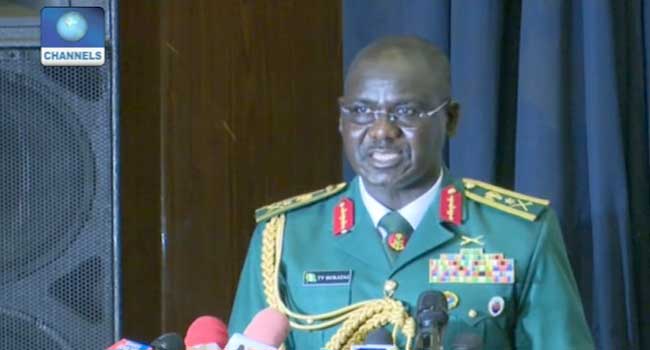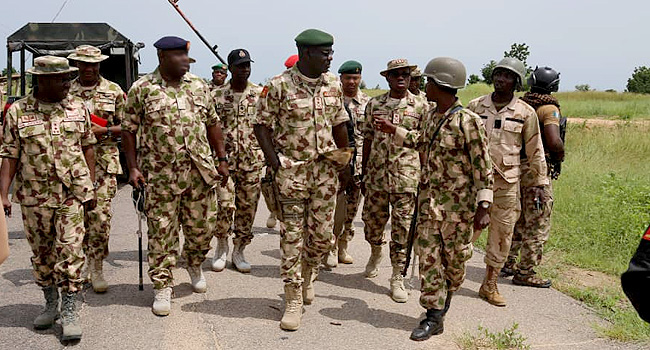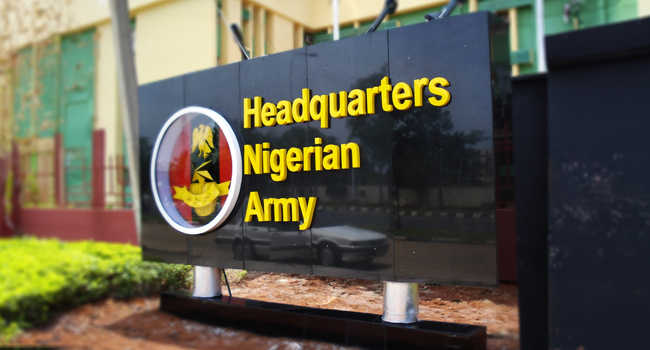
The Socio-Economic Rights and Accountability Project (SERAP), Enough is Enough (EiE), and BudgIT have demanded details of spending on Operation Lafiya Dole and Operation Crocodile smile from the Chief of Army Staff, Lt. General Tukur Buratai.
To ensure their demand is met, the three groups have sent a joint Freedom of Information request to the army chief.
Specifically, they want General Buratai to “urgently provide information on the 2015, 2016 and 2017 budget implementation reports of the Nigerian Army”.
The information demanded includes “the amounts released (financial implications) and expended in the fiscal years 2015, 2016, and 2017 for various operations the army carried out”.
All three civil society organisations disclosed their demands in a joint statement on Sunday. The statement was signed by Bamisope Adeyanju for SERAP, Seun Akinyemi for EiE Nigeria, and Atiku Samuel for BudgIT.
Other army operations for which they demanded information on the amount released and expended in 2015, 2016 and 2017 are Operation Safe Haven, Operation Python Dance, Operation Ruwan Wuta, Operation Delta Safe, Operation Mesa, Operation Harbin Kunama, Operation Awatse, and Operation Tsera Teku.
According to the statement, the FoI request was sent to the Army last week.
“Transparency of the budget process and its implementation is an essential condition to achieve good governance,” the groups said in defence of their request.
“The reports, if provided and published, will shed light on military spending and put to rest once and for all the perceived lack of transparency and accountability in the spending of military budgets, which has been a subject of intense public debate and concern.”
The groups intend to follow the FoI request up with legal action if it is not successful.
“If the requested information is not provided within 14 days of the receipt and/or publication of this letter, our organizations shall take all appropriate legal action under the Freedom of Information Act to compel you to comply with our request,” they said.
As far as the groups are concerned, the funds allocated to the military have not yielded the desired results, hence the request.
They said, “Several billions of naira allocated to the military to defend the country and protect its people have neither contributed to improving the ability of Nigerian soldiers to fight Boko Haram and other armed groups nor provided the much-needed security especially for Nigerians in the North-east of the country.”
While they noted that the FoI Act exempted the disclosure of some classes of information, they stressed that they took that into consideration and stressed that in their request.
The FOI request read in part: “The information being requested does not come within the purview of the types of information exempted from disclosure by the provisions of the FOI Act.
“The information requested for, apart from not being exempted from disclosure under the FOI Act, would serve the national interest, public welfare, public interest and peace, human rights, good governance, transparency and accountability.
“By virtue of Section 1(1) of the Freedom of Information Act, 2011, we are entitled as of right to request for or gain access to information, including information on 2015, 2016 and 2017 budget implementation reports of the Nigerian Army, and the amounts released (financial implications) and expended in fiscal years 2015, 2016 and 2017 for the various operations listed, which have yielded no tangible result.
“Also, by virtue of Section 4(a) of the FOI Act, when a person makes a request for information from a public official, institution or agency, the public official, institution or agency to whom the application is directed is under a binding legal obligation to provide the applicant with the information requested for, except as otherwise provided by the Act, within 7 days after the application is received.”



